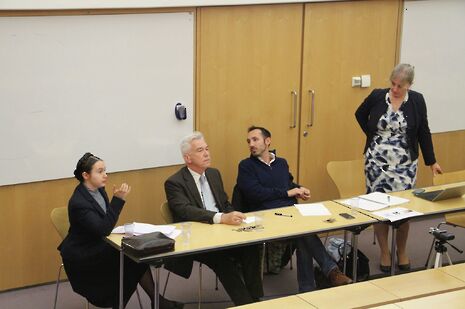Brexit is the ‘tip of the iceberg’
Joe Robinson reports from the first of a series of talks considering how Britain has dealt with Brexit and where we go from here

The University of Cambridge’s ‘Brexit Week’ began on Tuesday, inaugurating several days of lectures and talks looking at the causes and implications of the UK’s shock vote to leave the European Union on 23rd June.
In the first of these events, entitled ‘Brexit: how and why did we get here?’, the Law Faculty’s Professor Catherine Barnard chaired a discussion of academics from the fields of history, economics and political science as they offered diverse views on how the leave vote came about.
The first speaker, historian Professor Robert Tombs, offered an explanation that centred around the long history of British Euroscepticism and Britain’s distinct politics and culture.
“We’re not very enthusiastic Europeans,” he observed, noting that only Cyprus rivalled the UK for its ambivalence towards the continent’s political union.
Tombs argued that not only had Britain’s retention of the pound made leaving easier, versus those countries limited by their membership of the single currency, but he postulated that the UK had an entirely different “political culture” from our European neighbours.
On the result of the referendum, the prominent Eurosceptic argued that “soft Brexit is not Brexit” and that only full exit from the single market constituted an adequate reflection of the will of the British people.
He was followed by Dr Victoria Bateman, the Caius Economics fellow who notably turned up naked to a faculty meeting earlier this year to protest the possibility of Brexit. She sought to explain the referendum’s result in historical context, seeing it as a “working-class revolt” with its roots in the Industrial Revolution.
She claimed that it represented a reaction to the deindustrialisation of the Thatcher period, but noted that it brought together disparate groups from disaffected northern industrial areas and southern Eurosceptic towns in an uneasy coalition.
Bateman noted that Brexit “seemed to offer all things to all people”, and that social conservatives for whom “the clock needs to be turned backwards” wanted entirely different outcomes from Brexit than post-industrial areas.
Inevitably, she argued, people would “feel betrayed” and that the referendum would mean a new series of conflicts as the extrication process began.
The final speaker was Dr Chris Bickerton from the Department of Politics and International Studies (POLIS), who during the referendum campaign advanced a left-wing case for Brexit based on the enhanced accountability of politicians to the British public.
Observing that the referendum campaign “didn’t actually focus on the EU”, with the Remain and Leave sides exclusively concerned with the economy and immigration respectively, Bickerton suggested that this was because of an issue in how the European Union is conceptualised.
He compared it to a “mirage”, arguing that it “appears tangible at first, but the closer you get it begins to tremble and quiver”, eventually giving way to a reality made up of national governments seeking greater and greater legitimation from their membership of the EU.
The referendum, he suggested, resulted from the “hollowing out” of democracy and the poor relationships between citizens and their governments.
According to Bickerton, the key challenge at the heart of the referendum was how to govern across the “void” created by the retreat of politicians into the state and the public into their private spheres.
He suggested that the referendum offered the prospect of enhanced accountability for politicians who, following Brexit, could no longer hide behind the EU as an excuse for their failures or shortcomings.
Bickerton postulated that this trend of elite and public withdrawal, having blended with the previously marginal force of Euroscepticism in the UK, would spread throughout Europe, with the possibility of referenda in Italy and France in the near-term.
Brexit was, for Bickerton, only the “tip of the iceberg”. What lies beneath the water is other EU member states for whom the EU will not be a settled issue for some time to come
 News / Cambridge bus strikes continue into new year16 January 2026
News / Cambridge bus strikes continue into new year16 January 2026 News / Uni members slam ‘totalitarian’ recommendation to stop vet course 15 January 2026
News / Uni members slam ‘totalitarian’ recommendation to stop vet course 15 January 2026 Science / Why smart students keep failing to quit smoking15 January 2026
Science / Why smart students keep failing to quit smoking15 January 2026 Interviews / The Cambridge Cupid: what’s the secret to a great date?14 January 2026
Interviews / The Cambridge Cupid: what’s the secret to a great date?14 January 2026 News / Cambridge local elections to go ahead in May despite local government reorganisation16 January 2026
News / Cambridge local elections to go ahead in May despite local government reorganisation16 January 2026









